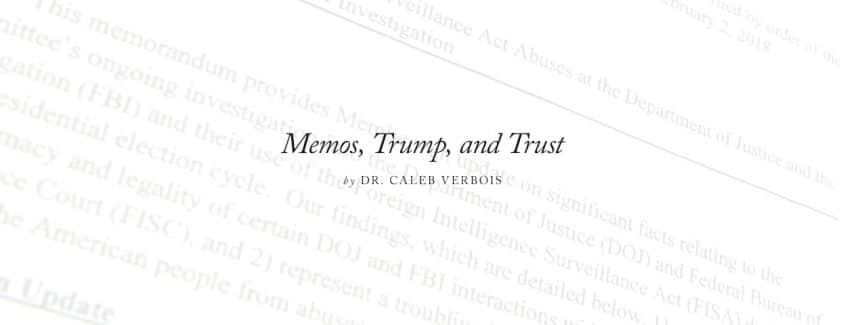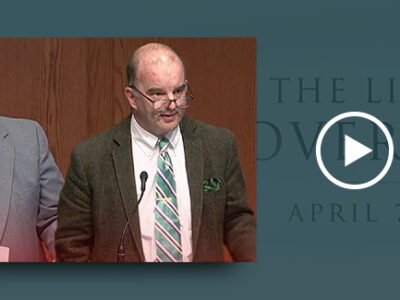
Perhaps we should not be surprised by the hysteria over the release of Congressman Devin Nunes’ memo. After all, “memogate” has filled Washington with hysteria for weeks. Former deputy assistant to President Trump, Sebastian Gorka, claimed it showed abuses “100 times” worse than the causes of the American Revolution, while former Republican congressman Joe Scarborough countered that the memo was a “sleazy political purge.”
This, before either of them had actually read it.
What should we make of this memo that Trump supporters claim proves FBI collusion, and Trump detractors deride as an attempt to derail Robert Mueller’s investigation?
The truth, as happens all too frequently lately, lies somewhere far away from the rhetoric of our political elite and media commentators.
First, what is the memo about? In October of 2016, the Obama administration’s Justice Department sought a FISA warrant for Carter Page, a volunteer campaign advisor for Trump. FISA is the Foreign Intelligence Surveillance Act of 1978, which theoretically governs all foreign intelligence where one party to a communication, like an e-mail, is on American soil. The FISA court is a secret court of review that considers warrant applications under FISA. The FISA court process is somewhat different than an ordinary attempt by the police to get a warrant because it is designed to act quickly. In addition, the Attorney General typically has to sign off on every warrant request, which means his or her credibility with the court is at stake. That is partly why the court approved 99.97% of requests from 1979 to 2012, denying only 11 requests out of 33,900.

Registration is now open! “World War I and the Shaping of the Modern World” Click here for more information.
The process only works, however, because the court depends and trusts that the Attorney General will give the court all relevant material when it requests a warrant.
That is where the Nunes memo comes in. According the memo, which was written by the Republican staff on the Intelligence Committee, which is tasked with overseeing the Executive Branch’s efforts in intelligence matters such as FISA warrants, the Obama administration was only able to secure the approval of the FISA court by using information from the so-called Steele Dossier, which was actually opposition research paid for by Hillary Clinton’s campaign. The memo concludes that the Obama administration deliberately failed to tell the court that Steele worked for Hillary’s campaign, despite the fact that it was obviously relevant information, given that it was seeking a warrant to spy on a member of Trump’s campaign. Critically, the FBI deputy director admitted last fall that without the Steele dossier the FBI would not have even requested a FISA warrant. The memo goes on to claim that the wife of Obama’s Associate Deputy Attorney General, Bruce Ohr, also worked on the opposition research campaign against Trump, and that Ohr gave her research, paid for by Clinton, to the FBI which used the information to gain the warrant. Bundled together, the memo suggests that the Obama administration politicized the FBI and DOJ.
What does this all mean? That depends. The FBI says the memo lacks key “contextualizing” facts. But of course, the FBI has an incentive to discount the memo, as it comes out of this looking rather terrible. The FISA court process only works if the president’s administration gives them trustworthy information. That is partly why it is important that Congress has an oversight role over the process. Someone needs to watch the chicken coop. But even if the FBI is lying that does not mean everything in the memo is accurate. We cannot know, because we do not have access to the underlying evidence.
However, three things can be said:
First, the Democrats have overstepped to suggest that the publication of this memo is a historic breach of national security. Nunes has followed exactly the process he ought to. He could have simply leaked the memo to the press: The New York Times or Buzzfeed would have printed it in full without hesitation. Instead, he went through the appropriate process in Congress and requested that the administration declassify the document in the interest of transparency.
Second, even if everything in the memo is accurate, it does not disprove claims about Trump’s campaign and Russia. The mere fact that the FBI lacked sufficient evidence to get a warrant without misleading the court does not mean Page was innocent. Nothing in the memo proves Mueller’s special investigation should be shut down.
Third, and perhaps most important, this memo crystalizes the continued breakdown of trust in American institutions. The public’s trust in our government is at an all-time low. According to Gallup, only 40% of the public trusts the Supreme Court most of the time, 12% trust Congress, 32% trust the presidency, and 27% trust newspapers. Gallup has not asked Americans if they trust the FBI. Perhaps Gallup should start.




